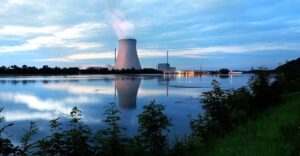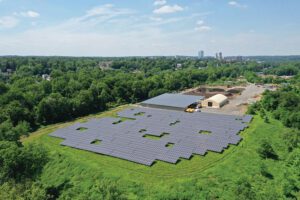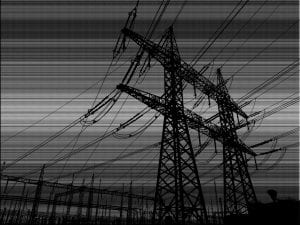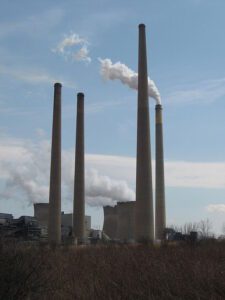Legislative
-
Nuclear
Germany Mulls Postponing Nuclear Exit
Germany’s government is weighing how the closure of the country’s last three nuclear power plants in December 2022 will affect its grid this upcoming winter as the country scrambles to secure sufficient energy supplies amid a decline in Russian gas deliveries. A formal decision on whether or not to keep Isar 2, Emsland, and Neckarwestheim […]
-
Legal & Regulatory
Biden Signs Bill to Transform U.S. Energy, Combat Climate Change
President Biden’s signing of the Inflation Reduction Act (IRA) should provide further impetus for growth of U.S. renewable energy, coming on the heels of a report from the Federal Energy Regulatory Commission (FERC) that installations of solar and wind power accounted for more than two-thirds of new domestic utility-scale generation in the first six months […]
-
Renewables
Renewable Energy, Electrification Big Winners in Inflation Reduction Act
The U.S. House on Aug. 12 passed a bill with major implications for the power generation industry, joining the U.S. Senate in supporting the Inflation Reduction Act (IRA). The bill, which now heads to President Joe Biden for his signature, includes major provisions to combat climate change, including support for a variety of clean energy […]
-
Renewables
How a Solar and Storage Portfolio Ramped Up a City’s Sustainability and Financial Outlook
The City of White Plains, New York, enlisted DSD Renewables to design, engineer, develop, construct, and finance a nine-site, 6.8-MW community solar and 1.7-MW/8-MWh energy storage portfolio. The
-
Commentary
Reaction Swift After Supreme Court Strips EPA’s Authority Over Emissions
Reaction on both sides of the issue was swift after the U.S. Supreme Court in a 6-3 vote said the U.S. Environmental Protection Agency (EPA) should not have the authority to broadly regulate emissions of greenhouse gases (GHG) from the nation’s power plants. The case, West Virginia vs. EPA, could have ramifications for federal government […]
-
Commentary
The Biden Administration Should Change Course or Else Your Energy Investment Portfolio Could Suffer
Americans now face the highest inflation rates in more than a generation. That’s certainly true for energy prices, where oil has soared past $100 a barrel. Americans are now paying $5 a gallon for gas on average heading into the summer. But energy scarcity and high prices aren’t just problems for consumers; they’re problems for investors […]
-
Solar
Biden Pausing Solar Tariffs, Pushes for U.S. Production
The White House is moving to support the solar power industry, including U.S. manufacturing of solar panels and other equipment, by pausing tariffs on imported solar panels from four Southeast Asian countries. The 24-month moratorium announced June 6 will exist while U.S. officials continue to look at the practices of Cambodia, Malaysia, Thailand, and Vietnam, […]
-
Gas
SRP Warns Arizona Regulator Reliability at Risk by 2024 Without Gas Plant Expansion
Salt River Project Agricultural Improvement and Power District (SRP) is seeking a rehearing and reconsideration of the Arizona Corporation Commission’s (ACC’s) denial of a major gas power plant expansion, which the public power utility has stressed will be crucial for near-term system reliability and long-term renewable integration. In a filing on May 16, SRP urged […]
-
Nuclear
DOE’s Decision to Build Versatile Test Reactor Coming Soon
(Updated—May 19, 2022): The Department of Energy (DOE) is poised to decide whether it will build the 300-MWth Versatile Test Reactor (VTR), a fast neutron national user facility that could provide the nuclear industry with a much-needed high-performance testing capability for advanced reactors and existing commercial reactors. The DOE’s Office of Nuclear Energy (DOE-NE) on […]
-
Climate change
Climate Change Policy Belongs in Congress, Not State Courts
Crafting solutions to address the pressing challenges of our time is Congress’s foremost job. There is no doubt that policy-making can be messy, take time, and require compromise. But, overall members and their staff do incredible work for the American public. During my tenure serving Indiana’s 9th Congressional District, I prided myself on working with […]
-
T&D
DOE Launches $2.5B Fund to Upgrade and Build New Transmission Lines
The Biden administration has launched efforts to shape the $2.5 billion Transmission Facilitation Program (TFP), a key Infrastructure Investment and Jobs Act (IIJA) initiative dedicated to building out critical new transmission lines and related facilities across the country. The Department of Energy’s Grid Deployment Office on May 10 issued a joint notice of information (NOI) […]
-
Coal
Homer City Coal Plant to Keep All Three Units Operating
The Homer City coal-fired power plant will continue operating, according to multiple news sources in western Pennsylvania, where the plant is located. Owners of the three-unit, 1,884-MW generating station in Indiana County, about 45 miles east of Pittsburgh, had been contemplating shuttering one or more units, while also exploring options to add renewable energy to […]
-
Coal
New Jersey’s Last Two Coal Power Plants to Close within Months
The New Jersey Board of Public Utilities (NJBPU) approved a petition filed by Atlantic City Electric Co. (ACE) that modifies power purchase agreements (PPAs) and power sales agreements (PSAs) between ACE and Chambers Cogeneration Ltd. and Logan Generating Co., the last two coal-fired electricity generation units in New Jersey. Under the agreements, coal-fired generation will […]
-
Nuclear
Pressure on U.S. Nuclear Power Could Mount if Sanctions Imposed on Russian Uranium
Russia’s invasion of Ukraine and ensuing sanctions may have a limited immediate impact on the U.S. nuclear industry, despite its reliance on uranium imports. Potential implications over the longer term, however, require urgent action, officials from the Nuclear Energy Institute (NEI) said. NEI CEO and President Maria Korsnick told reporters at the ongoing CERAWeek by […]
-
Coal
Ban on Russian Energy Imports Gains Bipartisan, Bicameral Steam in Congress
Eighteen bipartisan U.S. Senators are backing a bill that would direct the president to declare a national emergency and prohibit imports of Russian energy commodities, including crude oil, petroleum products, liquefied natural gas (LNG), and coal. While the measure does not include Russian uranium, a senior Department of Energy official said addressing U.S. reliance on […]
-
Environmental
SCOTUS Hears Arguments on EPA’s Purview Over Power Plant GHG Emissions
The U.S. Supreme Court is hearing arguments on a landmark case that could determine whether the Environmental Protection Agency (EPA) has the authority to broadly interpret the Clean Air Act (CAA) to establish carbon emission standards for coal, oil, and gas-fired power plants. Arguments in West Virginia v. Environmental Protection Agency (No. 20-1530) presented to […]
-
Nuclear
Nuclear, Natural Gas Included in EU Taxonomy—With Potentially Problematic Conditions
Handing a muted victory to proponents of nuclear and gas, the European Commission (EC) on Feb. 2 adopted a measure that labels some nuclear and gas energy activity as climate-friendly investments. However, it set out strict, potentially limiting technical screening criteria for those activities to qualify, prompting pushback from the nuclear and gas industries. The […]
-
Legal & Regulatory
Litigation Is Not the Right Path for Climate Solutions
In late January, the U.S. Court of Appeals for the 4th Circuit in Richmond, Virginia, took up a case that could play an important role in deciding the future of climate change lawsuits in the U.S. The immediate issue is a dry question of procedure—the grounds for removal of a case from state court to federal court. But […]
-
Carbon Capture
Net-Zero Without Carbon Sequestration Is ‘Virtually Impossible’; Yet Site Acquisition and Permitting Hurdles Hinder Implementation
In a Flagship Report, the International Energy Agency said reaching net-zero carbon dioxide emissions is “virtually impossible” without carbon capture, utilization, and storage. Significant progress has
-
Commentary
Microgrids Can Save America’s Carbon-Zero Commitments and Electrified Future
On Friday, November 5, Congress passed a landmark infrastructure bill that apportions $65 billion to rebuilding our aging electric grid. Although we should applaud this long overdue measure, we need to be realistic about its impact. $65 billion is not nearly enough to modernize the U.S. electric grid, nor is it enough to protect against weather-related outages and cyberattacks. We continue […]
-
News
ERCOT Confident Generators Deficient During Uri Freeze Debacle Ready for Winter
The vast majority of 324 electric generation units and transmission facilities in Texas have fully met or “go beyond” new state winter weatherization requirements, the Electric Reliability Council of Texas (ERCOT) said in a final readiness report filed with the Public Utility Commission of Texas (PUCT) on Jan. 18. Onsite inspections at 302 generation units […]
-
Hydrogen
DOE’s First $1B Loan Guarantee in Years Seeks to Bolster Turquoise Hydrogen Process
The Department of Energy’s (DOE’s) first conditional loan guarantee offered to a non-nuclear project since 2016 will finance the expansion of a pioneering commercial-scale “turquoise hydrogen” and carbon black production facility in Nebraska. The agency’s Loan Programs Office (LPO) on Dec. 23 offered a commitment to guarantee a loan of up to $1.04 billion under […]
-
Nuclear
DOE Begins Fleshing Out Availability of Advanced Nuclear Reactor Fuel
The Department of Energy (DOE) has issued a request for information (RFI) on a planned temporary federal program to ensure enough high-assay low-enriched uranium (HALEU) will be available to jumpstart deployment of a new fleet of advanced nuclear reactors. Comments received over the next month in response to the DOE’s Dec. 14–issued RFI will inform […]
-
Nuclear
DOE Revives Consent-Based Siting Process for Commercial Spent Nuclear Fuel Disposal
Potentially jumpstarting long-paralyzed efforts to address the federal management of spent nuclear fuel (SNF), the U.S. Department of Energy (DOE) on Nov. 30 issued a request for information (RFI) that could determine where the agency will temporarily consolidate and store spent fuel from nuclear reactors across the nation. Under the RFI, the DOE is seeking […]
-
Commentary
COP, New Energy Laws, and the Power of Competition
There’s a lot going on in the energy world right now. The United Nations Climate Change Conference (COP26) is happening in Glasgow, Scotland. Congress recently passed major new energy legislation in the Infrastructure Investment and Jobs Act. And as consumers soon will find out if they don’t already know: much higher energy costs and heating bills are […]

























